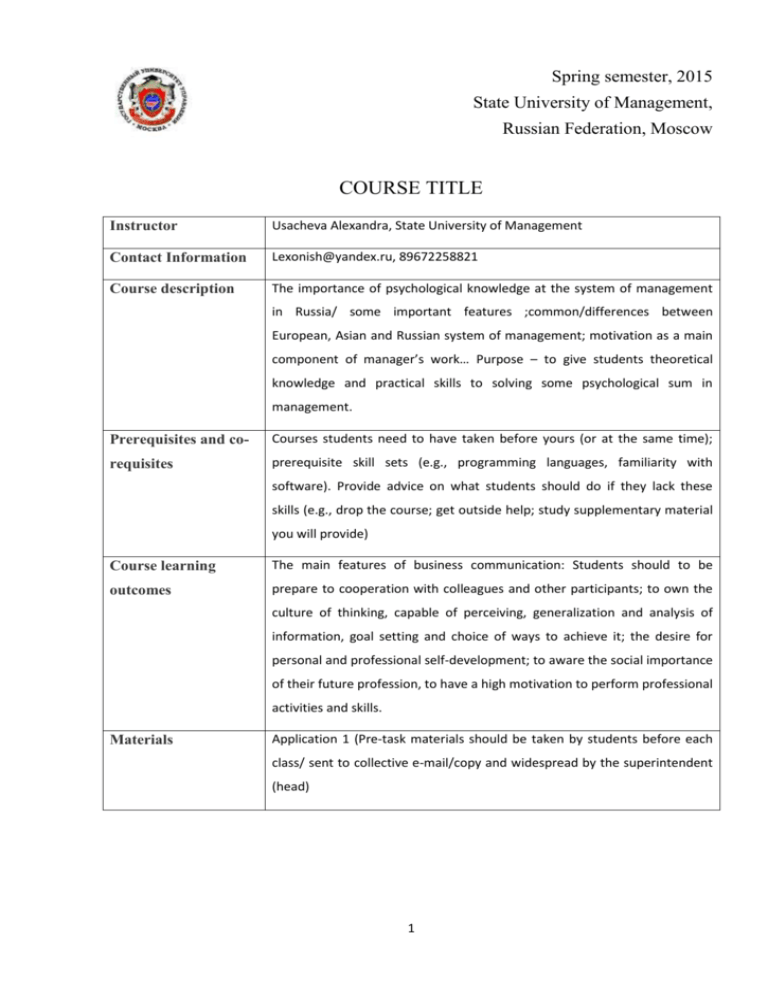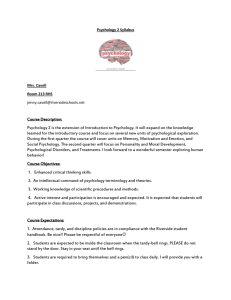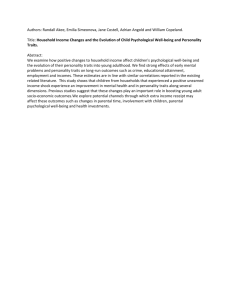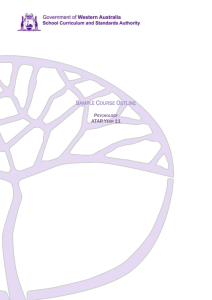State University of Management
advertisement

Spring semester, 2015 State University of Management, Russian Federation, Moscow COURSE TITLE Instructor Usacheva Alexandra, State University of Management Contact Information Lexonish@yandex.ru, 89672258821 Course description The importance of psychological knowledge at the system of management in Russia/ some important features ;common/differences between European, Asian and Russian system of management; motivation as a main component of manager’s work… Purpose – to give students theoretical knowledge and practical skills to solving some psychological sum in management. Prerequisites and co- Courses students need to have taken before yours (or at the same time); requisites prerequisite skill sets (e.g., programming languages, familiarity with software). Provide advice on what students should do if they lack these skills (e.g., drop the course; get outside help; study supplementary material you will provide) Course learning The main features of business communication: Students should to be outcomes prepare to cooperation with colleagues and other participants; to own the culture of thinking, capable of perceiving, generalization and analysis of information, goal setting and choice of ways to achieve it; the desire for personal and professional self-development; to aware the social importance of their future profession, to have a high motivation to perform professional activities and skills. Materials Application 1 (Pre-task materials should be taken by students before each class/ sent to collective e-mail/copy and widespread by the superintendent (head) 1 Class Schedule Week Topics Preparation Tests, projects, assignments 1 PSYCHE AND Hand out CONSCIOUSNESS materials/presentation power point 2 The same(continue topic) 3 THE EMOTIONAL - Hand out VOLITIONAL materials/presentation REGULATION OF power point BEHAVIOUR AND ACTIVITIES 4 The same(continue topic) Short reports, progress test 5 VOLITIONAL Hand out REGULATION OF materials/presentation BEHAVIOR AND ACTIVITY. power point PECULIARITIES OF REGULATION OF MANAGEMENT 6 The same(continue topic) 7 THE STRUCTURE AND Hand out FUNCTION OF materials/presentation MOTIVATION OF power point ACTIVITY 8 The same(continue topic) Short reports, progress test 9 PSYCHOLOGICAL Hand out CONCEPT OF materials/presentation PERSONALITY power point 10 The same(continue topic) 11 PERSONALITY TRAITS: Hand out 2 Role play THE TEMPERAMENT, materials/presentation CHARACTER AND power point ABILITIES. PSYCHOLOGICAL PROFESSIONALMANAGER 12 CONFLICTS Hand out Role play materials/presentation power point 13 14 Control test Application 2 The final grade based on: Type of work Percentage 50% Classroom Participation(including class activities) In-class Personal Presentation 30% Progress test 10% Control test(final examination) 10% Course policies and expectations No food brakes or snacks, can bring water Switch off the sound of mobile phones Respect for others, respectful language English Active participation during discussions Marking Lateness or absences… Application 1 Джемс У. Психология: пер. с англ. / под ред. Л.А. Петровской. - М.:Педагогика, 1991. - 368 с. - (Классики мировой психологии). - ISBN 5-7155-0402-3. 3 Обозов Н.Н. Психология работы с людьми: советы руководителю. - Киев: Политиздат Украины, 1990. - 205 с.: ил. - ISBN 5-319-00621-7. Кордуэлл М. Психология. А-Я = The complete А - Z Psichology: словарь-справочник / пер. с англ. К.С. Ткаченко. - М.: Фаир-пресс, 2000. - 442 с. - ISBN 5-8183-0105-2. Немов Р.С. Психология. В 2 т. Т. 1 : Общие основы психологии. - М.: Владос: Просвещение, 1994. - 576 с. - ISBN 5-09-005103-8. Психология конфликта / сост. и общ. ред. Н.В. Гришиной. - СПб.: Питер, 2001. - 441 с.: ил. (Хрестоматия по психологии). - ISBN 5-272-00335-7. Психология мотивации и эмоций / под ред. Ю.Б. Гиппенрейтер, М.В. Фаликман. - М.: ЧеРо, 2002. - 751 с. - (Хрестоматия по психологии). - ISBN 5-88711-152-6. Изард К.Э. Психология эмоций = The Psychology of Emotions / пер. с англ. А. Татлыбаевой. СПб.: Питер, 2000. - 460 с.: ил. - (Мастера психологии). - ISBN 5- 314-00067-9. Ильин Е.П. Психология воли. - СПб.: Питер, 2000. - 280 с.: ил. - (Мастера психологии). - ISBN 5-046-0125-3. Мейли Р. Структура личности.// Экспериментальная психология / Под ред. П. Фресса и Ж. Пиаже. - Т. 5. - М., 1975. - С. 196-283. Нюттен Ж. Мотивация.// Экспериментальная психология / Под ред. П. Фресса, Ж. Пиаже. Т. 5. - М., 1975. - С. 15-110. Чалдини Р. Психология влияния = Influence Science and Practice / пер. с англ. Е. Волков, И. Волкова. - СПб.: Питер, 2000. - 270 с.: ил. - (Мастера психологии). - ISBN 5-8046-0001-Х. Юнг К.Г. Структура психики и процесс индивидуации. М., 1996 Creativity and reason in cognitive development / edited by J. C. Kaufman, J. Baer. - Cambridge ; New York : Cambridge University Press, 2006. Dweck C. S. Self-theories: Their role in motivation, personality and development. - Philadelphia, 1999. Keirsey D., Bates M. Please Understand Me: Character and Temperament Types. - Delmar, CA., 1984. Rokeach, M. Beliefs, Attitudes and Values. San Francisco, 1968. L. Kelly , J. M. Finkelman. The Psychologist Manager. Success Models for Psychologists in Executive Positions. Hogrefe Publishing GmbH, 2012 4 Application 2 SECTION 1. PSYCHE AND CONSCIOUSNESS TOPIC 1. INTRODUCTION TO THE DISCIPLINE OF ‘PSYCHOLOGY’ THE CONNECTION PSYCHOLOGY AND MANAGEMENT The value of psychological knowledge for professional management activity in modern world. Scientific and practical psychology, their differences and relationships. The emergence of psychology as a science. The history of development of psychological knowledge as a subject of science. The main directions and schools of psychology. Place of the psychology in the system of Sciences. The main tasks and peculiarities of psychology as a science. The structure of modern psychology, its industry. Research methods in psychology. Basic principles and categories. Communication of scientific fields of psychology and management. Psychological competence of the Manager. SECTION II. THE EMOTIONAL - VOLITIONAL REGULATION OF BEHAVIOUR AND ACTIVITIES. TOPIC 2. EMOTIONS AND FEELINGS Features of emotions and feelings as forms of mental reflection. Classification of emotions and feelings. Mood, affections, passions as a kind of emotional experiences. Characteristic of the higher senses. The functions of emotions and feelings. Methods of influence on the emotional experience. The development of the emotional sphere of the personality of a professional Manager. TOPIC 3. VOLITIONAL REGULATION OF BEHAVIOR AND ACTIVITY. PECULIARITIES OF REGULATION OF MANAGEMENT The General notion of free will. Nature and psychological structure volitional actions. The main functions will. The presence of obstacles, the struggle of motives as a condition for the emergence and implementation of an act of volition. Adoption and implementation of a volitional decision. The value of will in the organization and regulation of professional activity. The characteristic qualities of the personality of the Manager and the ways of their development. TOPIC 4. THE STRUCTURE AND FUNCTION OF MOTIVATION OF ACTIVITY. THE PSYCHOLOGICAL STRUCTURE OF MANAGEMENT ACTIVITY The concept of activity, behaviour and activities. Structure and activities. Management activities. Understanding motivational events. Motivation as a condition of human activity. The concept of needs. Classification needs. The structure needs. The concept of motive. Mechanisms of development of 5 motivational sphere. Types of motives (conscious and unconscious motives). The motives and goals. The impact of the level and character of motivation on the course and productivity of the actions of a professional Manager. Theories of motivation. SECTION III. PSYCHOLOGICAL CONCEPT OF PERSONALITY TOPIC 5. THE PSYCHOLOGICAL CONCEPT OF PERSONALITY. THE IDENTITY OF THE PROFESSIONAL MANAGER Identity as a product of life of the human individual in society. The correlation of the notions: human, individual, personality, individuality. The modern concept of personality. The notion about the structure of the personality. Conscious and unconscious in the structure of personality. Dynamic characteristics of the personality (the desire to balance the desire to stress that the principle of self-development). Periodization of the development of personality. Socialization of personality. The main factors of development. Crises personal development. Protective mechanisms and maintain the stability of personality. Personal orientation. The structure and types of orientation of the individual. Dynamics of development of professional orientation of the individual. Self-identity. The formation of an adequate professional self- evaluation Manager. The concept of a career. The career of a professional Manager. TOPIC 6. PERSONALITY TRAITS: THE TEMPERAMENT, CHARACTER AND ABILITIES. PSYCHOLOGICAL PROFESSIONAL-MANAGER Temperament as the dynamic characteristics of the individual. The correlation properties of the nervous system and temperament of the individual. The structure of temperament. Types of temperament.The Manager’s temperament. The concept of nature. The structure of nature. Formation of character. Character typology. The nature of the Manager. Structure and kinds of abilities. General and special abilities. The development of abilities. Abilities and talents. The talent. Methods of diagnostics capabilities. Ability for management. TOPIC 7.CONFLICTS Conflicts.Conflicts in professional activity of a Manager. The mechanisms of formation of conflicts. Types of conflicts. Ways out of the conflict. 6








